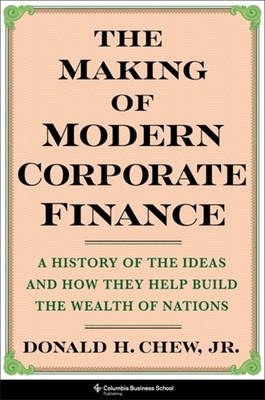
- We will send in 10–14 business days.
- Author: Donald Chew
- Publisher: Columbia Business School Publishing
- ISBN-10: 0231211104
- ISBN-13: 9780231211109
- Format: 16 x 23.6 x 2.8 cm, kieti viršeliai
- Language: English
- SAVE -10% with code: EXTRA
Reviews
Description
Why did the "stagflation" of the 1970s--the improbable combination of high unemployment and runaway inflation--prove so painful and protracted? What explains the U.S. stock market's remarkable forty-year run of 12 percent average annual returns since then? Why is Japan still mired in a decades-long recession--and the Chinese economy in a tailspin? And what accounts for the resilience of U.S. stock and labor markets in the wake of the COVID-19 pandemic and the Fed's record interest rate hikes?
Donald H. Chew, Jr., argues that answers to these questions lie in the principles and methods of "modern corporate finance." Ideas formulated and tested by finance scholars--notably, an efficient stock market in which prices reflect the long-run values of public companies and a "market for corporate control" that exerts continuous pressure on management--informed and spurred the investor-driven capitalism that has produced the world's most productive and valuable companies. Drawing on his career-long relationships with leading academics and practitioners, Chew profiles key figures in the development of modern corporate finance while emphasizing their counterintuitive lessons for shareholders, companies, and countries. Corporate efficiency and value creation, he contends, are the fundamental source of the social wealth essential to addressing challenges such as poverty and climate change. Lively and provocative, this book makes corporate finance approachable--and even admirable--for readers interested in how the success and failure of companies affect their lives.EXTRA 10 % discount with code: EXTRA
The promotion ends in 23d.06:43:43
The discount code is valid when purchasing from 10 €. Discounts do not stack.
- Author: Donald Chew
- Publisher: Columbia Business School Publishing
- ISBN-10: 0231211104
- ISBN-13: 9780231211109
- Format: 16 x 23.6 x 2.8 cm, kieti viršeliai
- Language: English English
Why did the "stagflation" of the 1970s--the improbable combination of high unemployment and runaway inflation--prove so painful and protracted? What explains the U.S. stock market's remarkable forty-year run of 12 percent average annual returns since then? Why is Japan still mired in a decades-long recession--and the Chinese economy in a tailspin? And what accounts for the resilience of U.S. stock and labor markets in the wake of the COVID-19 pandemic and the Fed's record interest rate hikes?
Donald H. Chew, Jr., argues that answers to these questions lie in the principles and methods of "modern corporate finance." Ideas formulated and tested by finance scholars--notably, an efficient stock market in which prices reflect the long-run values of public companies and a "market for corporate control" that exerts continuous pressure on management--informed and spurred the investor-driven capitalism that has produced the world's most productive and valuable companies. Drawing on his career-long relationships with leading academics and practitioners, Chew profiles key figures in the development of modern corporate finance while emphasizing their counterintuitive lessons for shareholders, companies, and countries. Corporate efficiency and value creation, he contends, are the fundamental source of the social wealth essential to addressing challenges such as poverty and climate change. Lively and provocative, this book makes corporate finance approachable--and even admirable--for readers interested in how the success and failure of companies affect their lives.

Reviews